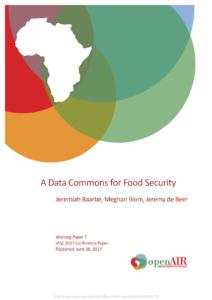 Jeremiah Baarbé, Meghan Blom, Jeremy de Beer
Jeremiah Baarbé, Meghan Blom, Jeremy de Beer
Proceedings of the 2017 IASC Conference
Open AIR Working Paper No. 7/17
Full text on SSRN
Executive Summary: Agricultural and nutritional data is an increasingly vital resource in the advancement and innovation of farmer organizations, food production, value chain development, and provision of services (Jellema, Meijninger, and Addison, 2015). Modern farmers rely on computational and precision agriculture to inform decisions. Datasets such as weather data, market price data, and agricultural inputs fuel these tools, which range from simple graphs to emerging artificial intelligence networks (GODAN, 2015). Access to and use of such data can play a key role in addressing global food insecurity by “enabling better decision making, transparency and innovation” (Open Data Charter, 2016). With this growing recognition however, is the understanding that ownership rights remain a major factor in the access to and use of data, distinct from yet, as important, as the availability of education, skills, technology, infrastructure, and finances (de Beer, 2016).
The importance of data for agriculture underscores a growing view that data has replaced oil as the world’s most valuable resource (e.g. The Economist, 2017). For example, artificial intelligence relies on extremely large datasets to teach algorithms how to solve complex problems. As a global resource, the data commons proposed in this paper applies beyond agriculture to any data infrastructure. However, agriculture is a fitting locus for a data commons as the birthplace of the commons and as the site of other social certification programs such as the Fair Trade movement.
The field of agriculture also highlights an important geopolitical dynamic with data. In complex global markets, access to data can create situations of unequal power for those most vulnerable (e.g. Ferris and Rahman, 2016: 2; Davies, 2015). Current paradigms of data ownership and property rights reinforce these inequalities in ways that threaten sustainable development and food security. Most legal rights to data are owned by intermediaries that invest in the collection of data, arrangement of databases, safeguarding of confidential information, or similar activities. The lack of enforceable data rights owned by certain communities, particularly smallholder farmers, is an important ethical issue that contributes to inequality and marginalization.
The current contract-based model for access to open data leaves many stakeholders vulnerable to the whims of entities that own data, without addressing more systemic challenges and opportunities for open data governance. Meanwhile, expanding ownership rights to protect individual or community data contributors could cause significant complications for the intermediaries that practice and promote open data. There needs to be a shift towards encouraging the growth of innovative, sustainable and equitable platforms that allow for all players involved to receive benefits (Frischmann, Madison, and Strandburg, 2014: 11).
The ‘data commons’ offers a way to provide more equitable data rights for vulnerable communities and individuals, including small-holder farmers. This approach to agricultural and nutritional data stems from the “knowledge commons” a sharing model in which knowledge and information resources are shared to produce creative and innovative products (Frischmann, et al., 2014: 5). It builds on the “growing realization that legal facilitation of innovation and creative production cannot be confined to a simple set of property rules to incentivize individuals to innovate” (Frischmann, et al., 2014: 11).
This paper uses the Institutional Analysis and Development (“IAD”) framework to develop and understand the ‘data commons’. As identified by Fischmann et al., (2014), this paper also embraces the analogy between the natural environment and the commons and uses this link as a lens to view the establishment of a data commons that seeks to address global challenges of food insecurity.
Instead of expanding or contracting ownership rights, the commons evokes the need for mutual responsibility towards data as a shared resource. A data commons views the actors who provide, collect, clean, interpret, and use data as stakeholders. As in a physical commons, a stakeholder approach acknowledges that actors are involved in inputs and outputs. Farmers contribute, governments, intermediaries and firms collect, and consumers develop new insights. Each input is necessary to produce useable data.
Legal and institutional mechanisms are needed to enable a data commons. These mechanisms would recognize the contributions of all stakeholders and distribute rights in ways that reinforce participation in the commons. Our proposal builds on the Open Data movement by looking to the legal and institutional processes used by Fair Trade movements to create successful commons.
The paper is structured as follows. Part 1 applies the IAD framework to computational agriculture, noting that legal and policy discussions often overlook the role of data contributors. Part 2 builds on the IAD analysis by considering the problems that arise when contributors’ needs are overlooked. Part 3 considers the legal relationships between contributors, collectors, and consumers of data, often built through contractual licenses. We explore specific examples from three leaders in computational agriculture: John Deere, Plantwise, and Abalobi; and from two leaders in Open Data licensing: Creative Commons and the Open Data Commons. Part 4 explores building a back-to-front model license that can meet the needs of all stakeholders in the data commons. Part 5 looks to the Fair Trade movement for insight in growing traction for a data commons through social certification. Finally, Part 6 considers reasons for optimism, touching on how our framework and model license can apply beyond agriculture to other domains.




